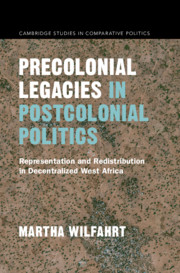 Precolonial Legacies in Postcolonial Politics
Precolonial Legacies in Postcolonial Politics One of the central claims of this study is that the impact of informal social institutions is contingent on the formal institutional environment they operate within. This chapter looks at the historical trajectory of basic public goods investments in Senegal from the onset of colonial rule in 1880 to the present to evaluate this claim by extending the dataset on village-level public goods access backward in time to the onset of French colonial rule using archival data and ministerial reports. By so "decompressing" history, the analysis unpacks spatial and temporal processes to isolate the 1996 decentralization reforms as the moment that precolonial legacies emerge to shape the spatial distribution of local public goods access. At the same time, the historical dataset allows me to take into account prominent historical alternative explanations that suggest enduring colonial legacies might supersede the precolonial effects I document. I find that the colonial past did matter, but that its effects on access to rural public goods have largely faded by the era of decentralization.
To save this book to your Kindle, first ensure [email protected] is added to your Approved Personal Document E-mail List under your Personal Document Settings on the Manage Your Content and Devices page of your Amazon account. Then enter the ‘name’ part of your Kindle email address below. Find out more about saving to your Kindle.
Note you can select to save to either the @free.kindle.com or @kindle.com variations. ‘@free.kindle.com’ emails are free but can only be saved to your device when it is connected to wi-fi. ‘@kindle.com’ emails can be delivered even when you are not connected to wi-fi, but note that service fees apply.
Find out more about the Kindle Personal Document Service.
To save content items to your account, please confirm that you agree to abide by our usage policies. If this is the first time you use this feature, you will be asked to authorise Cambridge Core to connect with your account. Find out more about saving content to Dropbox.
To save content items to your account, please confirm that you agree to abide by our usage policies. If this is the first time you use this feature, you will be asked to authorise Cambridge Core to connect with your account. Find out more about saving content to Google Drive.